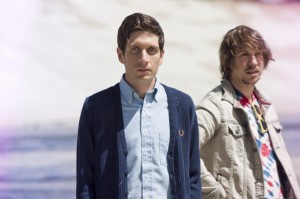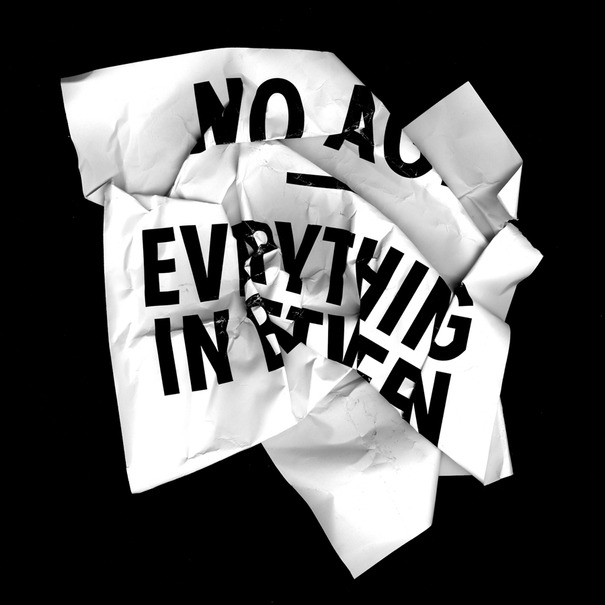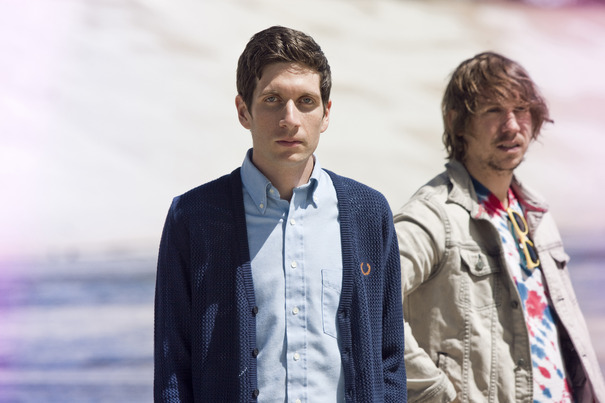
Randy Randall, guitarist of the punk rock duo No Age with drummer and vocalist Dean Allen Spunt, emerged from the Los Angeles D.I.Y. art-punk scene, where there weren’t stage barriers between bands and audiences and bouncers patting you down at the door. Embracing this spirit of making and playing music, the band debuted on FatCat Records in 2007 with Weirdo Rippers, and in 2008, they joined up with the record label Sub Pop for Nouns. In September, No Age put out Everything in Between, which many say is their best album yet – almost by accident. Their latest Sub Pop release packs their familiar punch and layers distorted guitar rock and a combination of grating and dreamy samples. It’s harsh yet beautiful, revealing a darker, more complex face of the band that contrasts their brighter, noisier first two albums. The Quad recently caught up with Randall in a phone interview about their new record and the challenges for today’s D.I.Y. artists. No Age played at the Middle East Downstairs last night with the Needy Visions and Lucky Dragon.
How was recording Everything in Between different from recording your first two records?
The way Dean and I work is, as we’re writing a song, one or both of us has a sound in mind already. We have ideas about how it should sound on record as we’re writing it. So, we go in there and try to get as close to the sound we have in our heads as we can. This time around, we were just worn out at some point because we’ve been writing for a long time and also touring for a long time, so when we went into the studio, we sort of just got what we could, and then we would come back and listen to the mixes and remix. It was sort of trial and error, so by the time we got to the studio we were usually sort of tired. We were a little more hands-off on this record in terms of over-analyzing every little sound just because of where we were at in our lives. There was so much going on that getting into the recording process we weren’t 100% focused, which is something I regret, but I feel like, for whatever reason, it sort of worked.

I feel proud of the record now that I listen to it, but at the time, it was such a conflict–not between us, but just individually in our personal lives. We were just having a hard time just trying to live a normal life, I think, in some ways. After two years of being on the road and having this “time off”–it was time off but it wasn’t really time off because we were in our practice space writing five days a week and then recording for 14 hours a day for like 10 days in a row. It was hard to keep up with some kind of personal life as well, so I think that colors the record in a weird, personal way for us. Listening to it and thinking about how the songs were written, things feel a little darker. It just comes from an honest place of what we were feeling at that time. The songs are reflections of our emotional state at that time. I know on past records, we were a little more fun and bright. We always just try to be honest when we’re writing. The only thing we really know for inspiration or where to go is inside to figure out what resonates with us in a nonverbal level, on a musical level, so that’s sort of how these songs came about.
What’s your song writing process?
Dean writes all the lyrics and does all the vocals, so I think a lot of times we’ll be writing and come up with some sort of musical idea, and I won’t really know what the vocals are until he goes into record them. On the last record, the song “Glitter” we had written, I really loved the song. I had no idea what Dean was going to do vocally, and I was sitting in the control booth with the engineer and I heard him do his first take on vocals, and it just took the song that I already thought was amazing and just gave me shivers. I remember listening to the CD-R of it in my car and thinking, “What the hell? How did we become this band? This is music. We actually wrote a song, and it’s good. I can listen to this. I love it.” In a way, it just sort of grows. I’ll send an idea his way and he’ll send it back and it will be better than what I sent and I’ll send it back to him. Just in terms of creating stuff together, it feels like more than the sum of its parts. I know I definitely couldn’t have constructed it on my own, and I know Dean couldn’t either. It’s nice to feel surprised with what we’re able to do.
As a band, you and Dean have really embraced the idea of do-it-yourself. Do you see this kind of D.I.Y. attitude throughout the country and the world in spite of the mass music industry?
Definitely. There’s a spirit where people find themselves in a town, maybe, that doesn’t really have the kind of venue or the kind of bands coming there that they want to see, so they set up their own venues. They write bands and get them to come out there. It’s very easy to recognize that spirit because that’s how we started doing this. We’re all trying to do the same thing. I see it all over. In Europe, the governments are usually a lot more understanding of squats and abandoned buildings that people take over, and that’s an acceptable form of running a venue. You don’t see that so much in America. The idea of private ownership of property–even if it’s an abandoned building or an abandoned lot, someone owns it and you can’t go in there. It’s someone else’s property. In Europe, there’s sort of the idea that it’s abandoned and no one’s using it, it’s public. So that’s different.
We had been playing music even before this band that Dean and I were both in. We booked all our tours ourselves. We didn’t really have the professional music world around us. It was great and we worked really hard and had a lot of fun and we just learned so much about traveling and touring and just being people and being a band. The overall idea is just to have passion about what you do. It takes a lot of work to be D.I.Y. To do something yourself means really being hands-on, and even if you have a booking agent or a record label helping you, you still have to be on top of it in order to make sure that it’s being done in a way that you feel is appropriate, so that’s kind of where we’re at. We have people and institutions in place that help us that basically provide a larger soap box for us to stand on that allow us to talk to more people, but we’re constantly monitoring and going over ideas and making sure that everything’s run though us so we can approve things along every step of the way, and sometimes things fall through the cracks, and it’s such a bummer that you kind of have to figure out how to put out the fires. So, what’s the point of going above ground? There’s a case to be said for just doing things the way that you do it and staying off the map of a major label. I think that’s entirely valid, and it totally makes sense.
I think we were at a point where we were interested and curious to see what was behind the curtain, behind the major label or the mainstream media world. We thought it would be interesting to find the cracks in the fence and get in there and try to change things from the inside, but I think we sort of reached a point where it’s like, that’s not our world. We snuck into the party, we’ve been there just long enough to realize the party sucks, and I think we’re slowly understanding this isn’t our world, this isn’t what we’re a part of. It was interesting, thanks for inviting us, but we’re going to start doing things more in our own way.
Was there one experience that really brought you to this realization?
I’ll not name names so I don’t get sued for anything, but we were asked to play at a really large venue opening up for two very large bands. It was right around the same time that a record we were going to put out was coming out. So, we wanted to play at a very small club in order to celebrate the release of the record, but the very large venue got upset that we were going to play at the small club, even though the small club only holds a hundred people, and the large venue holds thousands of people. They thought it was going to be a problem and affect their ticket sales. It proved to me that this was a business run on dollars and cents. It’s not really about making music. It’s about making money. They could be selling sausages or they could be selling tickets for concerts, it doesn’t matter. There’s nothing wrong with making money, but we want to do it in a way that makes sense for us. Music for us is creative and a fun, communal experience. We grew up playing shows at places where there were no back stages and there were no lines and people could go wherever they wanted to go. You’re all just watching the bands together. I wasn’t inspired to play music in a realistic way until I went to the Smell and I saw the people on stage were just the same as me.
The two worlds really have nothing to do with each other. The mainstream world can throw a lot of money in front of you and offer these ideas of easy money. If you’re broke and you’ve been broke for many years, getting money to play a show seems like a great thing to do. You have to way out the cost and benefit of it. We’re not so hard-line that it’s really one way or another. We don’t have rules for ourselves. We’re just people that try to make decisions. We’ve made mistakes, and hopefully we’ve learned from those mistakes and we’ll figure out how to do things better in the future. We’ve played really dumb shows for energy drinks and things. While you’re there, you’re like why are we doing this? It’s just hard. Then, the next month, they’re like hey, you want to play this show? And we’re like, wait, we just said that we’re never going to do this again. And then they come back with more money, and you’re like wait, shit, we really can’t do this, but that would pay my rent for two months or the rest of the year or something. You kind of scratch your head really hard and hopefully you make the right decision.


One Comment on “Q+A: Randy Randall of No Age on Their New Record, D.I.Y. and Mainstream Media”